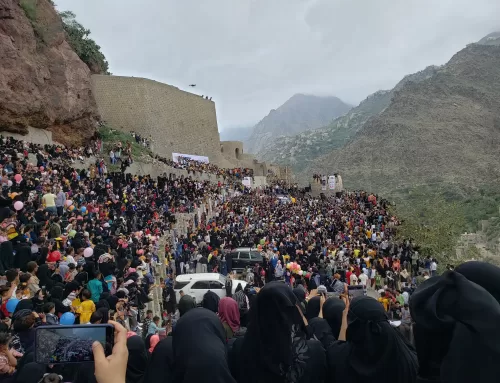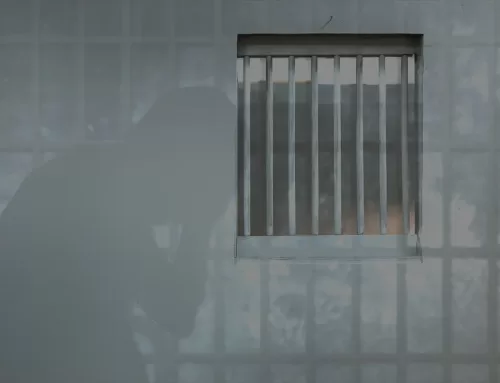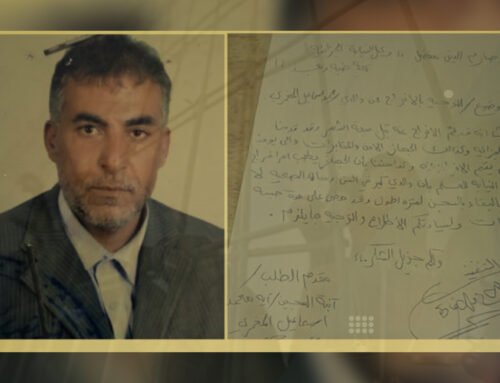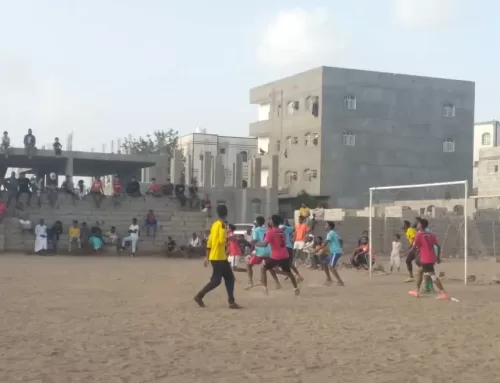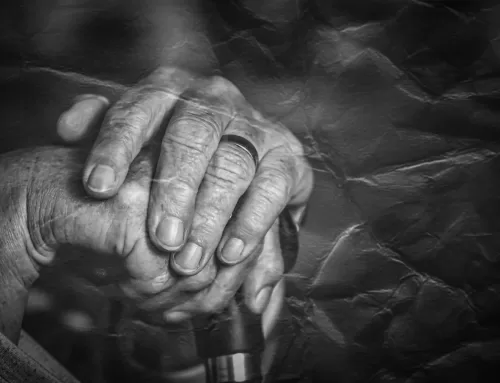We now have either of two death options: either to die of hunger or risk seeking livelihood in spaces full of mines.
March 15,2020
Ammar Hasan- Field Research Assistant ‘Mwatana”
It was 10 am, December 12, 2019, my mobile phone rang; when I picked the phone, someone form Dhubab district told me that an anti-personnel land mine was exploded in in this area injuring Haj Saleh and his wife while they were tending their sheep. My goodness! I know Haj Saleh; he is a shepherd and fisherman. I met him while I was in a field visit along with a local organization a month ago. At that time, he informed me that he and his son were arrested arbitrarily in 2017.
Violations at Dhubab district take various forms and the people of this area fall victims for such human rights violations. Every time I visit this district to make interviews with one of the victims, I get surprised that they suffer other violations which they insist to tell me about. In my first meeting with Haj Saleh asking him to present a witness to take one’s testimony about Haj Saleh’s incident, I got surprised that the witness himself has suffered from another violation.
There are various human rights violations in this district, yet the most pervasive violations are anti-personnel land” mines. Landmines in this area remain the overwhelming nightmare which claims human and animal lives”
In fact, this situation looks like the Chinese dragon legend in which every time the protagonist beheaded the dragon, two heads grew. It would also look like the Russian Matryoshka doll which consist of various dolls inside one another, each with a different shape.
Dhubab district in Taiz governorate, Yemen, houses one of the vital straits in the world i.e. Bab Al-mandab which overlooks two sees (the red sea and the Arab sea) shared by several Arab and African nations. It holds an agricultural and desert lands. It comprises several mountain chains including Saeed Ali, Al-Muthalath, Al-Omari, Al-Muddiah Al-Mutajawirah and Al-Sighriah, with all of these chains clasping one another. Such mountain range used to serve as a border protection for Yemen and the district of Dhubab in which there were border military forces and coast guards.
There are various human rights violations in this district, yet the most pervasive violations are anti-personnel land mines. Such land mines were planted everywhere in the district and are heavily concentrated in the eastern borders which are adjacent to Mawza’a district. Landmines in this area remain the overwhelming nightmare which claims human and animal lives. Most of the people of this district bear witness that these mines were planted by Houthis following their withdrawal from the district in January, 2017. “We, now, have either of two options of death; either to die of hunger or seek our livelihood to be claimed by anti-personnel mines” Said an old man from Dhubab district.
The people at Dhubab work in four major professions and no more: fishermen (the majority), cattle shepherds, farmers and lumberjacks. However, it is in this district where fishermen fall victims to anti-personnel mines which are like beasts awaiting them at every inch of the area which is 1557 square kilometer. Habeeb, a diver and fisherman, so passionate about fishing, a middle-aged man who spent most of his life in the sea. He never imagined that he would be unable to practice fishing, the profession which is the main source of livelihood for him and his little children. Looking at Habeeb’s face, you feel that he is a man full of prime and vigor. While he was fishing for a squid amongst the rocks in the see, he stepped on an anti-personnel land mine which exploded and blew off his feet and made him permanently disabled.
Habeeb’s friend, Fahd Mohammad, a 34-year old who lives in the neighboring village and works as a vulture hunter lost half of his body. Fahd used to work in a remote village with a few houses as a hawk hunter. Although Fahd adapted to the tough nature of the desert facing all its dangers, he has not been spared from the dangers of war. In July 2, while Fahd was hunting for hawks, he stepped on an anti-personnel land mine losing his left foot and his eyes as well as breaking his teeth and distorting his facial expression. When I asked Fahd how he is, “I am totally different” he replied. I left Fahd while he was on his crutches. Walking few steps further, I turned to him seeing one of his daughters clinging to him, hugging him; it is a heartrending scene as though the daughter says I still have a father!
“We no longer bear further displacement and suffering; we have been forced to go back to our houses even though we know for sure that our land is entirely unsafe.” Said Ali (one of the people from Dhubab district).
In one of the villages of Dhubab (i.e. Assaimen village), I was actively listening to some of the victims one after another. Suddenly, a boy riding a motorcycle was approaching me; his name is Haidari Ibrahim. He grew up in the desert along with his sheep using special communicative techniques to control his herds. The 14-year-old boy, used to walk around along with his sheep; playing and messing around while his sheep are grazing. He takes his sheep every morning and comes back at sunset. In the morning of April 20, Hider saw a cartoon in the middle of a mountain (Al-Muddiah mount). The cartoon made the child curious as to what would be in it! Looking at his sheep, Haidar signaled to the sheep to remain quiet until he comes back. The child went up the mountain to see what that cartoon is. Alas! An anti-personnel land mine exploded and destroyed his legs. The boy was carried out to his house with a half body. His eyes indicate misery and he looks forcibly restrained.
I would not exaggerate to say that Dhubab district has entirely become a deadly ground of death and famine. Every morning, the people at Dhubab stare at one another as though they are bidding each other the final farewell. This is because those who leave may not comeback alive, and those who return home, they often get back with a permanent disability due to landmines.
Many landmines and explosive devices get exposed by time due to flooding and winds. The people can see the landmines but no one can help removing them from their roads. I once visited Bahsa village along with my guide from the village. “Look at this anti-personnel mine on the right; it has been exposed by flooding but no one can remove it; we just sieged it with some bushes and thorns so that vehicles should not run over it, we have no alternative but to use these roads to survive even though we take risks …. we are forced to survive!” My guide explained.
Let me share with you another incident; three fatherless young sisters from Ubaido village, Umaimah (25), Mayasah (21) and Fatimah (18). They wanted to visit their grandmother in the neighboring village (Al-Kadahah village) which is only three kilometers away from their village. In October 5, 2017, they hired a Hilux car to Al-Kadahah village and on their way back home, a landmine exploded under the car. The explosion caused the young sisters some fractures and they all lost either of their eyes.
Nonetheless, all these incidents had not been wiped out from my memory than I received such an unfortunate call in which I was told that Haj Saleh and his wife stepped on an anti-personnel mine. Haj Saleh (60 years) and his wife Salma (40 years), would often leave their house searching for area of pasture for days and sometimes for a month in deserted areas in which can only hear bleating of sheep. In the morning of December 12, they took their sheep as usual for grazing at an area named Khabt Hunaish. While they were talking, Salma saw an anti-personnel mine which was exposed by flooding and she was about to step on it. She informed her husband to beware of that mine. They walked away from the mine and continued their way, yet another landmine was awaiting their fate. Unfortunately, Salma stepped on the mine and it exploded. The mine shrapnel penetrated Salma’s chest and she fell dead. Haj Saleh fractured his right leg. Looking at his wife at such a motionless state, he pulled himself on his back till he reached her to find that she passed away.
Haj Saleh was taken away to a hospital in Aden and he got the fracture repaired. But he is now alone visualizing his mate’s spirit which never leaves his imagination and made him greatly sorrowful. Three days later, I went to the district. Having arrived at the house of the victims, I saw a congregation of motorbikes. I asked the owner of the motorcycle I hired about what this congregation for. He told me that it was the third condolence day. When I got off the motorcycle, the people looked at me with anger and sadness. “What? Are you waiting until two or three of us die to come and take records and leave? We permanently loose our people, what are you going to do? An old man shouted! I was about to cry for the suffering and sadness of these people as I know for sure that all families in the district has suffered one form of loss or disability. I documented the violation and left sorrowful and helpless unable to render anything to console with them.
In Dhubab, people lose their relatives, belongings, vehicles, cattle and everything related to their life. Likewise, humanitarian and official bodies lose their humanity as they look at the machinery of death permanently claiming lives while keeping silent towards such a bloody scene.


